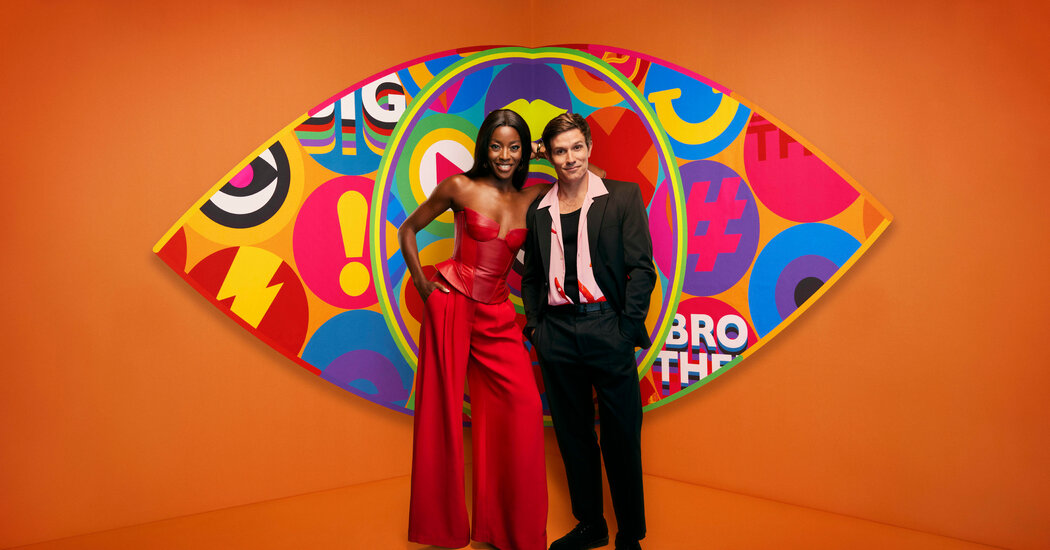In 2000, when the reality TV show “Big Brother” premiered in Britain and the United States, both versions had the same format: A group of contestants were filmed around the clock doing menial tasks and making endless small talk, and were evicted via weekly audience votes until a winner took home a cash prize.
After one season, CBS executives were disappointed by lackluster ratings, and changed the U.S. show into more of a game of strategy, in which the contestants voted each other out. British viewers, though, loved the public popularity contest, and the producers kept it.
“We, as a nation, became so obsessed,” the British show’s host, Davina McCall, said in a recent interview. Channel 4, the TV network, also broadcast a 24-hour live feed so viewers could even watch contestants, known as housemates, while they slept. In 2002, 9 million people tuned in to the Season Three finale, half of all British viewers watching TV in that time slot.
Early breakout “Big Brother” housemates became British celebrities, but over the years the show’s popularity waned, switching broadcasters in 2011 and finally getting canceled in 2018. (In the United States, the 25th season of “Big Brother” recently premiered, still on CBS.)
Now, “Big Brother” is returning to British screens, in a revival premiering Sunday. Its producers hope to recapture the series’ early popularity by once again offering viewers an unvarnished social experiment, bucking current trends in British television.
In recent years, “Love Island” has replaced “Big Brother” at the top of the British reality TV tree. The dating show — which also has versions across Europe and in the United States — features toned, glamorous young people, who may have even met already. The rebooted “Big Brother” arrives as “Love Island” ratings are in decline, with less than half the number of viewers tuning in for this year’s season premiere compared with four years ago.
Paul Mortimer, who commissioned the “Big Brother” revival for ITV, said that when it came to casting housemates, “what we absolutely are not looking for are a dozen social media influencers that are trying to win more followers.”
Instead, Mortimer said, once contestants entered the new Big Brother house, he “wanted them to encounter people that, by nature of where they live, by nature of their social class, by nature of their sexuality, by nature of their experience up to this point, they would never have met.” Viewers will be introduced to the new housemates during the series premiere.
AJ Odudu, one of the show’s hosts, said that British people “are, certainly on television, yearning for real authenticity.”
During the heyday of “Big Brother,” the show cast housemates from groups that were rarely depicted on British TV. Odudu said that by watching “Big Brother” while she was growing up in Blackburn, northern England, she encountered an openly gay person — Brian Dowling, who won Season Two — and an openly trans person — Nadia Almada, who won Season Five — for the first time.
When it comes to the British version of the reality show, “there is something socially cohesive about it,” said Misha Kavka, a professor of media culture at the University of Amsterdam. “Big Brother” can give viewers a “sense of who shares your social space, without literally having to engage with them,” she added.
Unlike “Love Island,” or other reality competition shows such as “The Bachelor,” in which conversations may be guided by an offscreen producer, the British “Big Brother” was also distinctive because of its unpredictability.
Will Best, Odudu’s co-host, said “We don’t know what is going to happen there. Nobody does.”
In the past, this freedom also created problems for the show. “Sometimes, you can put people together and magic happens, and sometimes you can put people together and fire happens,” McCall said. In 2004, the house was trashed during an explosive, drunken fight that had to be broken up by security guards. The series — and the spinoff “Celebrity Big Brother” — also made headlines in Britain following accusations of racist and bullying behavior inside the house.
ITV and Banijay, the production company behind the “Big Brother” revival, has announced what they called a “welfare package” for housemates including guidelines and training about what language and behavior is acceptable.
“I think we can still let drama play out, but at the same time, ensure that people are represented fairly,” Mortimer said.
The revival’s producers are hoping that, with an old format and new behavior guidelines, there will still be enough excitement to hold British viewers’ attention.
“Will it work? Will that old ‘Big Brother’ magic be there?” asked Natalka Znak, an executive on the revival. “Is it enough to see a mix of different people living together, playing funny games?”
She said that she wanted the show to attract new viewers, as well as “Big Brother” fans. “I hope it is enough to make my 16-year-old daughter and her friends watch it. That’s my job,” she said. “We just hope everyone becomes as obsessed with it as they did back in its day.”


